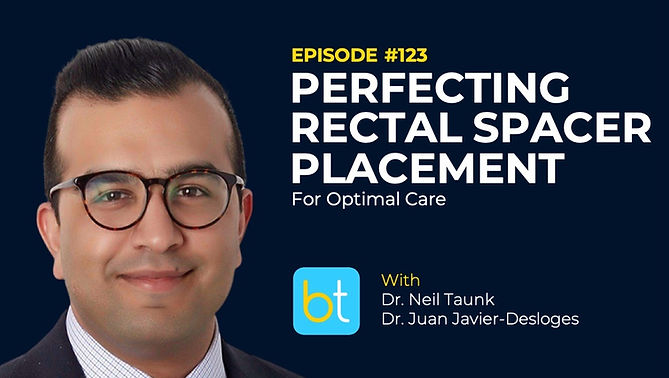BackTable / Urology / Podcast / Episode #123
Perfecting Rectal Spacer Placement for Optimal Care
with Dr. Neil Taunk
This week on BackTable Urology, Dr. Juan Javier-Desloges, a urologic oncologist at UC San Diego, interviews Dr. Neil Taunk, a radiation oncologist leading the Brachytherapy and Procedural Radiation program at the University of Pennsylvania, about his experience with using SpaceOAR rectal spacer for prostate cancer radiotherapy.
This podcast is supported by:
Be part of the conversation. Put your sponsored messaging on this episode. Learn how.

BackTable, LLC (Producer). (2023, September 29). Ep. 123 – Perfecting Rectal Spacer Placement for Optimal Care [Audio podcast]. Retrieved from https://www.backtable.com
Stay Up To Date
Follow:
Subscribe:
Sign Up:
Podcast Contributors
Synopsis
First, the doctors explore the nuances of rectal spacing and the best candidates for this procedure. They discuss various large-scale trials from different research institutions about the efficacy of rectal spacing in different types of radiation, like proton beam, external beam, and brachytherapy. He also notes the time crunch that comes with using a spacer and highlights the importance of understanding a patient's anatomy before performing the procedure. Additionally, he shares his insight on how extracapsular extension of the tumor can affect the rectal spacing procedure, as well as the potential benefits of rectal spacing for certain patient populations. Dr. Taunk also considers the differences between the two gels (Barrigel and SpaceOAR) available on the market and delves into specific differences between the two products.
Lastly, they emphasize the importance of pre-operative counseling for the imperfect management of patients because suboptimal gel placements and complications, such as intravascular injection and pulmonary embolism, are possible.
Resources
SpaceOAR Hydrogel by Boston Scientific
https://www.bostonscientific.com/spaceoar
Transcript Preview
[Dr. Juan Javier-Desloges]:
Yes. We've talked a lot about the basic setup, and I think that the audience probably has a good idea in mind of how they could do it in their office. How do you determine who is the best candidate for space, and do you do it in everybody? Does it matter to you if they're getting IMRT or SPRT or proton therapy or something else? Does the anatomy or the size or the location of the tumor matter to you?
[Dr. Neil Taunk]:
Yes, Juan, that's really great. Before going into say those indications and modalities, one aspect of the periprocedural setup I think is very important is who's helping you and what assistance you may have in your procedure. You can do this by yourself, meaning that you can set up the kit by yourself, your table by yourself, but it's really helpful if you have a very consistent nurse or a very consistent medical assistant that knows how to do at least a portion of the setup for you. Help you get your table laid out how you like, get your patient positioned how you like, as well as assembling the kit.
Boston Scientific is a paid advertiser of BackTable, LLC and is not responsible for the content beyond this paid scripted advertising message or promotional material.
SpaceOAR and SpaceOAR Vue Hydrogels are intended to temporarily position the anterior rectal wall away from the prostate during radiotherapy for prostate cancer and in creating this space it is the intent of SpaceOAR and SpaceOAR Vue Hydrogels to reduce the radiation dose delivered to the anterior rectum.
SpaceOAR and SpaceOAR Vue Hydrogels contain polyethylene glycol (PEG). SpaceOAR Vue Hydrogel contains iodine.
Prior to using these devices, please review the Instructions for Use for a complete listing of indications, contraindications, warnings, precautions, and potential adverse events.
The Materials available on BackTable are for informational and educational purposes only and are not a substitute for the professional judgment of a healthcare professional in diagnosing and treating patients. The opinions expressed by participants of the BackTable Podcast belong solely to the participants, and do not necessarily reflect the views of BackTable.
















